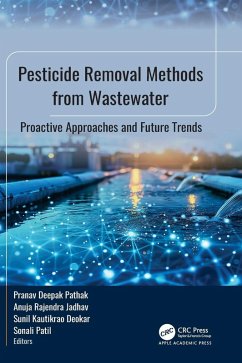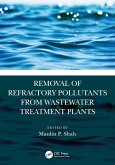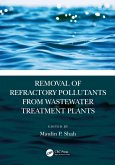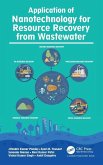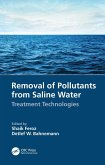Pesticide Removal Methods from Wastewater
Proactive Approaches and Future Trends
Herausgeber: Pathak, Pranav Deepak; Deokar, Sunil Kautikrao; Jadhav, Anuja Rajendra
Pesticide Removal Methods from Wastewater
Proactive Approaches and Future Trends
Herausgeber: Pathak, Pranav Deepak; Deokar, Sunil Kautikrao; Jadhav, Anuja Rajendra
- Gebundenes Buch
- Merkliste
- Auf die Merkliste
- Bewerten Bewerten
- Teilen
- Produkt teilen
- Produkterinnerung
- Produkterinnerung
Examines pesticide removal methods from wastewater, covering nanomaterials that remove hazardous compounds, new electrochemical technologies and perovskite oxide semiconductors, advantages of biopesticides, construction of water treatment facilities, and affordable techniques for eliminating pesticides.
Andere Kunden interessierten sich auch für
![Wastewater and Public Health Wastewater and Public Health]() Wastewater and Public Health156,99 €
Wastewater and Public Health156,99 €![Removal of Refractory Pollutants from Wastewater Treatment Plants Removal of Refractory Pollutants from Wastewater Treatment Plants]() Removal of Refractory Pollutants from Wastewater Treatment Plants60,99 €
Removal of Refractory Pollutants from Wastewater Treatment Plants60,99 €![Removal of Refractory Pollutants from Wastewater Treatment Plants Removal of Refractory Pollutants from Wastewater Treatment Plants]() Removal of Refractory Pollutants from Wastewater Treatment Plants133,99 €
Removal of Refractory Pollutants from Wastewater Treatment Plants133,99 €![Advanced Treatment Technologies for the Removal of Microplastics in Wastewater Advanced Treatment Technologies for the Removal of Microplastics in Wastewater]() Advanced Treatment Technologies for the Removal of Microplastics in Wastewater133,99 €
Advanced Treatment Technologies for the Removal of Microplastics in Wastewater133,99 €![Advances in Natural Dyes for Environmental Protection Advances in Natural Dyes for Environmental Protection]() Advances in Natural Dyes for Environmental Protection247,99 €
Advances in Natural Dyes for Environmental Protection247,99 €![Application of Nanotechnology for Resource Recovery from Wastewater Application of Nanotechnology for Resource Recovery from Wastewater]() Application of Nanotechnology for Resource Recovery from Wastewater212,99 €
Application of Nanotechnology for Resource Recovery from Wastewater212,99 €![Removal of Pollutants from Saline Water Removal of Pollutants from Saline Water]() Removal of Pollutants from Saline Water186,99 €
Removal of Pollutants from Saline Water186,99 €-
-
-
Examines pesticide removal methods from wastewater, covering nanomaterials that remove hazardous compounds, new electrochemical technologies and perovskite oxide semiconductors, advantages of biopesticides, construction of water treatment facilities, and affordable techniques for eliminating pesticides.
Produktdetails
- Produktdetails
- Verlag: Apple Academic Press
- Seitenzahl: 400
- Erscheinungstermin: 21. Oktober 2025
- Englisch
- Abmessung: 260mm x 183mm x 26mm
- Gewicht: 945g
- ISBN-13: 9781779641205
- ISBN-10: 1779641206
- Artikelnr.: 74426742
- Herstellerkennzeichnung
- Libri GmbH
- Europaallee 1
- 36244 Bad Hersfeld
- gpsr@libri.de
- Verlag: Apple Academic Press
- Seitenzahl: 400
- Erscheinungstermin: 21. Oktober 2025
- Englisch
- Abmessung: 260mm x 183mm x 26mm
- Gewicht: 945g
- ISBN-13: 9781779641205
- ISBN-10: 1779641206
- Artikelnr.: 74426742
- Herstellerkennzeichnung
- Libri GmbH
- Europaallee 1
- 36244 Bad Hersfeld
- gpsr@libri.de
Pranav Deepak Pathak, PhD, is an Associate Professor at the MIT School of Bioengineering Sciences and Research, Pune, India. His research specialization is biorefinery, biomass and waste utilization, and wastewater treatment. He has published research papers, edited books, and written book chapters. He has more than 14 years of teaching experience in the fundamentals of biochemical engineering, wastewater treatment, biotransport, mass transfer, heat transfer, solid waste management, and reaction engineering. Anuja Rajendra Jadhav, PhD, is an Associate Professor at the MIT School of Computing, Pune, India. With over 15 years of teaching experience, she contributes to academic development, including curriculum design, program enhancement, maintaining academic standards, and implementing effective teaching and learning methodologies. She holds multiple granted patents and has participated in workshops and training sessions covering diverse topics such as 3D interaction design, machine learning, artificial intelligence, and deep learning. Sunil Kautikrao Deokar, PhD, is an Assistant Professor at Anuradha Engineering College, Chikhli, District Buldana, India. He possesses over 10 years of teaching experience. He has published papers in reputable SCI/SCIE journals and contributed chapters to academic books. Additionally, he has acted as a co-principal investigator for a project funded by the Science and Engineering Research Board (SERB). Sonali Patil, PhD, is a Professor and Head of the Computer Engineering Department at Pimpri Chinchwad College of Engineering, affiliated with Savitribai Phule Pune University, India. With over 22 years of academic experience, she has delivered expert talks on information security and blockchain technology. Her research contributions include over 110 publications in journals and conferences. Her research has been recognized with prestigious awards, including the IEEE Innovator/Researcher of the Year Award-2021 by IEEE Pune Section and the Women Researcher Award by Science Father Organization, India.
1. The Fate of Pesticides in Wastewater: A Review 2. Role of Activated
Carbons and Nanomaterials in the Removal of Pesticides from Wastewater and
Future Trends of Nanofertilizers 3. Activated Carbon in Pesticide Removal:
Characterization, Mechanisms, and Future Prospects 4. Use of Activated
Carbons in Pesticide Removal from Wastewater: Review and Future Prospects
5. Effective Adsorption Strategies for Pesticide Removal from Water and
Wastewater 6. Adsorptive Removal of Chlorinated Herbicide from Water Using
Activated Carbon 7. Activated Carbon-Based Photocatalysts for the Removal
of Pesticides 8. Electrochemical Processes for the Removal of Pesticides
from Wastewater: Bioelectro, Photoelectro, and Conventional Electrochemical
Approaches 9. Application of Perovskite Oxides for Removal of Emerging
Organic Pesticides 10. Biopesticides: The Eco-Friendly Choice over
Synthetic Pesticides 11. Biological Methods for Pesticide Removal: A
Systematic Review 12. Utilizing Entomopathogenic Organisms in Viticulture:
Contemporary Insights and Future Directions for Sustainable Pest Control
Strategies
Carbons and Nanomaterials in the Removal of Pesticides from Wastewater and
Future Trends of Nanofertilizers 3. Activated Carbon in Pesticide Removal:
Characterization, Mechanisms, and Future Prospects 4. Use of Activated
Carbons in Pesticide Removal from Wastewater: Review and Future Prospects
5. Effective Adsorption Strategies for Pesticide Removal from Water and
Wastewater 6. Adsorptive Removal of Chlorinated Herbicide from Water Using
Activated Carbon 7. Activated Carbon-Based Photocatalysts for the Removal
of Pesticides 8. Electrochemical Processes for the Removal of Pesticides
from Wastewater: Bioelectro, Photoelectro, and Conventional Electrochemical
Approaches 9. Application of Perovskite Oxides for Removal of Emerging
Organic Pesticides 10. Biopesticides: The Eco-Friendly Choice over
Synthetic Pesticides 11. Biological Methods for Pesticide Removal: A
Systematic Review 12. Utilizing Entomopathogenic Organisms in Viticulture:
Contemporary Insights and Future Directions for Sustainable Pest Control
Strategies
1. The Fate of Pesticides in Wastewater: A Review 2. Role of Activated
Carbons and Nanomaterials in the Removal of Pesticides from Wastewater and
Future Trends of Nanofertilizers 3. Activated Carbon in Pesticide Removal:
Characterization, Mechanisms, and Future Prospects 4. Use of Activated
Carbons in Pesticide Removal from Wastewater: Review and Future Prospects
5. Effective Adsorption Strategies for Pesticide Removal from Water and
Wastewater 6. Adsorptive Removal of Chlorinated Herbicide from Water Using
Activated Carbon 7. Activated Carbon-Based Photocatalysts for the Removal
of Pesticides 8. Electrochemical Processes for the Removal of Pesticides
from Wastewater: Bioelectro, Photoelectro, and Conventional Electrochemical
Approaches 9. Application of Perovskite Oxides for Removal of Emerging
Organic Pesticides 10. Biopesticides: The Eco-Friendly Choice over
Synthetic Pesticides 11. Biological Methods for Pesticide Removal: A
Systematic Review 12. Utilizing Entomopathogenic Organisms in Viticulture:
Contemporary Insights and Future Directions for Sustainable Pest Control
Strategies
Carbons and Nanomaterials in the Removal of Pesticides from Wastewater and
Future Trends of Nanofertilizers 3. Activated Carbon in Pesticide Removal:
Characterization, Mechanisms, and Future Prospects 4. Use of Activated
Carbons in Pesticide Removal from Wastewater: Review and Future Prospects
5. Effective Adsorption Strategies for Pesticide Removal from Water and
Wastewater 6. Adsorptive Removal of Chlorinated Herbicide from Water Using
Activated Carbon 7. Activated Carbon-Based Photocatalysts for the Removal
of Pesticides 8. Electrochemical Processes for the Removal of Pesticides
from Wastewater: Bioelectro, Photoelectro, and Conventional Electrochemical
Approaches 9. Application of Perovskite Oxides for Removal of Emerging
Organic Pesticides 10. Biopesticides: The Eco-Friendly Choice over
Synthetic Pesticides 11. Biological Methods for Pesticide Removal: A
Systematic Review 12. Utilizing Entomopathogenic Organisms in Viticulture:
Contemporary Insights and Future Directions for Sustainable Pest Control
Strategies

